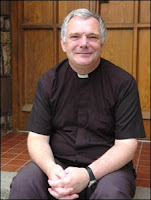Ok·to·ber·fest [ok-toh-ber-fest] noun
2. any similar festival held usually in the autumn.
3. a strong lager made originally in Germany for the Oktoberfest celebration; sweet and copper-colored.
4. an autumn festival that involves merrymaking and drinking beer.
Also, Octoberfest.
This Wednesday night, I (rather reluctantly!) participated in my first-ever root beer chugging contest. The occasion was Bethel’s first-in-many-years Oktoberfest. Up until a few hours before the event, I had only faint ideas as to what to expect. While the flyer and map that I had seen, listed an impressive number of entertainment activities, I did not anticipate that the event would turn out this spectacular.
The festivities began with a delicious potluck dinner consisting of such German staple foods as potato salad, sauerkraut, red cabbage, sausage, and pretzels, followed by “scary desserts,” followed by an apple pie contest, sponsored Labor Day Retreat Team (MC’d by Molly Schrey and Liz Barton). The winning pie (out of seven wonderful entries) was Barbara Misch’s delicious creation—judge by all three clergy judges as superior in terms of visual appeal, texture, and taste. Runner-up winners were Maggie Emmert (2nd prize) Kathy Arnold (3rd prize).
After the apple pie contest, the Oktoberfest activities spilled out from Torvend Hall onto most of the Bethel campus. There were children’s crafts (corn husk dolls making sponsored by Maggie Emmert), games for younger children (various bean bag tossing games ), games for teenagers and adults (root beer chugging contest sponsored by Bethel’s young adult group, the Network; pie throwing sponsored by Ed Fox; Kathy & Dave Arnold’s home-made electronic game; various jr. high games sponsored by Robyn Winegardner and Susan Leavitt), children’s book donations (sponsored by Bethel’s library team), card writing (sponsored by Bethel’s Stephen’s ministry group), apple tasting (sponsored by Liz Tribby), and printing on an amazing little letter press (sponsored by Dave Tribby). For many of these activities, participants could earn raffle tickets. At the close of these activities, flower arrangements (donated by Sue Jacobus) and gift bags were raffled off in Torvend Hall. The evening concluded with a closing prayer.
Thank you to all who made this celebration such a wonderful event that brought together Bethel members and friends of all ages. In addition to all those who organized games and activities, set up, clean up, and potluck items, a special thank you goes to Patricia Myerholtz, who thought up activities and recruited volunteers for the event. May the fun and joviality of this night bring us closer to each other and help knit the bonds of Christian friendship and love.
P.S.: One question, though, remains for me – given that the Munich Oktoberfest revolves around beer, rather than root beer, was this really an Oktoberfest?





